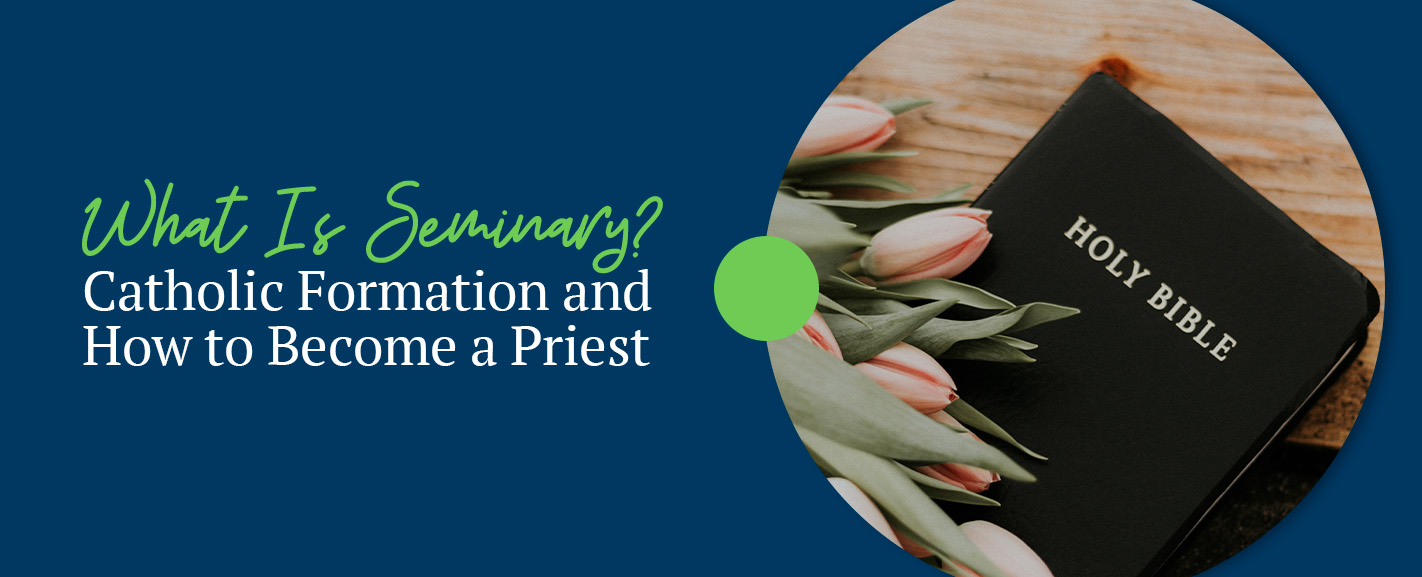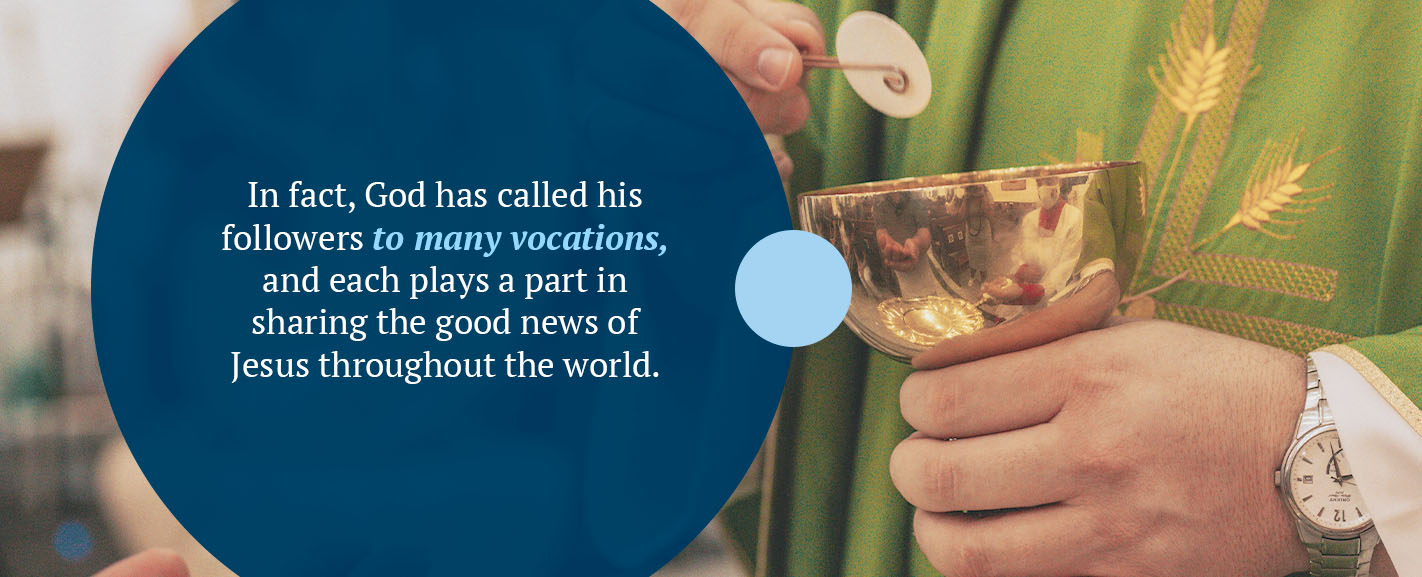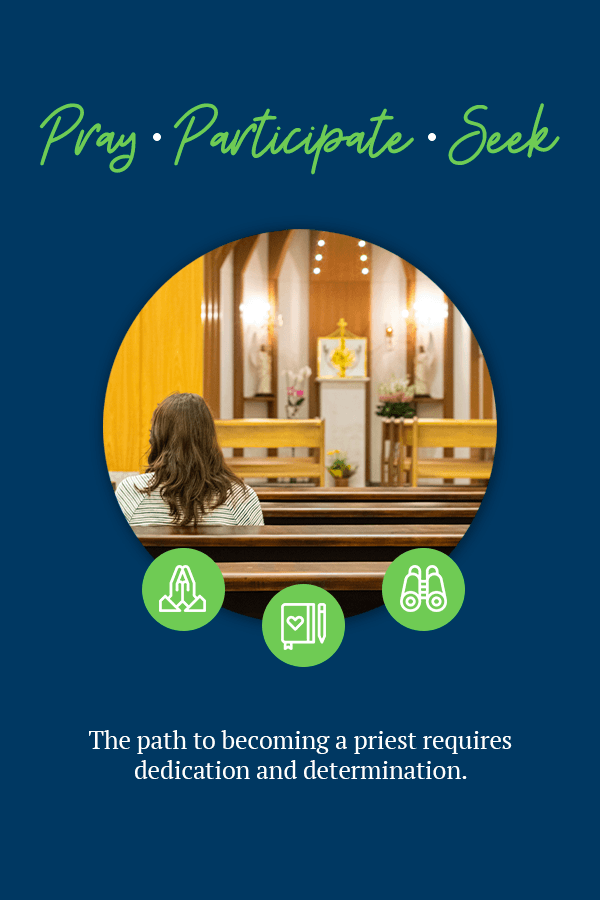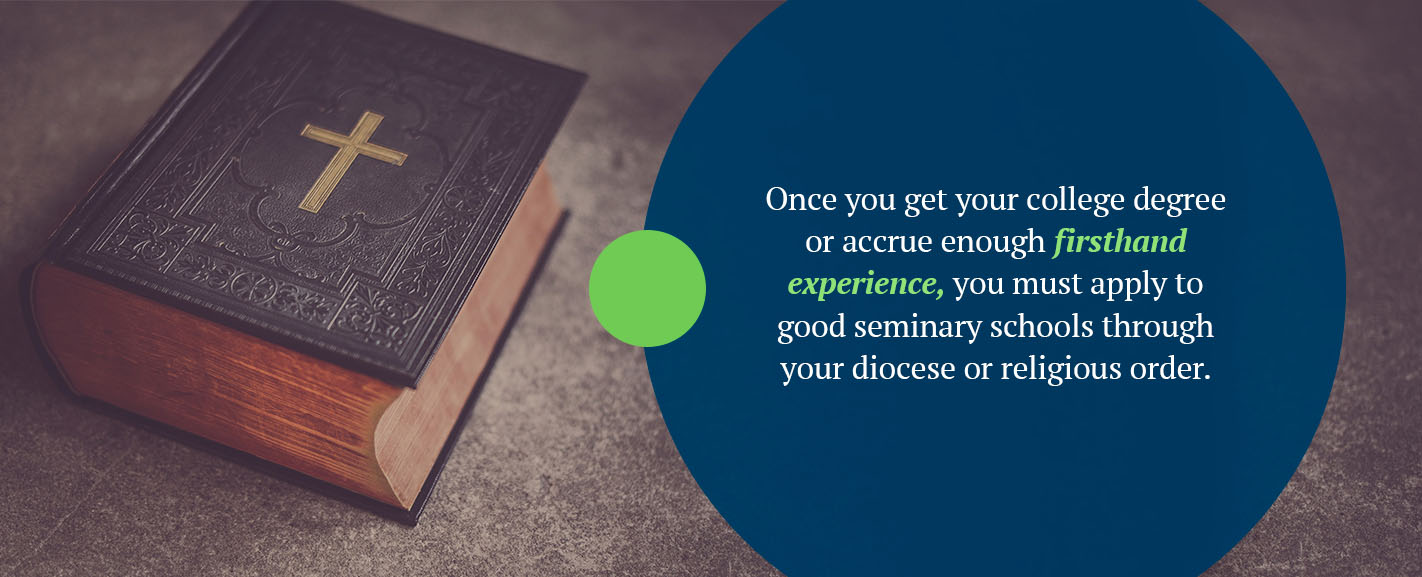
Throughout history, many people have obeyed the honorable calling and became Catholic priests. When a person dedicates themselves to God’s work, they can experience fulfillment unlike any this world has to offer. The responsibilities of a priest are many, but so are the blessings experienced along the way.
If you’re feeling God calling you to carry out his work on earth as a Catholic priest, you may have a few questions. How many years does it take to become a priest? What is seminary school like? Do I need seminary classes in theological writings to become a priest? Learn more about seminary, Catholic formation and how to become a priest below.
7 Steps to Become a Catholic Priest
Becoming a Catholic priest is a decision you should take seriously. It’s also one that takes time to truly come to fruition, so you need to be sure you’re ready to take the necessary steps. As you approach the following seven steps to become a priest, remember that only some are called to the priesthood. You can still honor God without being a priest. In fact, God has called his followers to many vocations, and each plays a part in sharing the good news of Jesus throughout the world.
Here are the seven main steps you must take to become a priest.
1. See if You Meet the Basic Requirements
You must meet several requirements to be a priest. The good news is that you can satisfy many of these requirements later in the process. They’ll come with time as you grow as a person and seek God’s will in achieving priesthood. But at the very beginning, you must make sure you qualify to be a priest at the most basic levels.
Here are some basic requirements you must meet:
- You must be a man.
- You must be at least 25 years old.
- You must have been baptized.
- You must have undertaken confirmation.
- You must be unmarried.
- You must not have gone through a divorce or must annul your marriage if you are separated.
- Two years must pass after becoming a widower to allow time for mourning before making priestly promises.
If you meet these foundational requirements, you can take the next step with confidence. But be ready, because the next step will require a great deal of soul searching and making sure entering the priesthood is truly the right decision for your life.
2. Analyze Your Faith to See if the Priesthood Is the Right Path for You
Step one is easy because you either meet the requirements or you don’t. This next step can be a bit more challenging, as it demands self-reflection, wisdom and discernment. Put simply, you should know that God is calling you to the priesthood before you get too far in the process. Otherwise, you could spend years working to become a priest only to find out that God actually wanted to use your gifts and talents somewhere else.
The path to becoming a priest requires dedication and determination. You must have sound belief and firm faith. In life, everyone deals with multiple paths before them. But if you’re feeling the tug to do something else with your life, you may want to reconsider joining the priesthood or at least put it on hold until you are ready to commit to all the process demands.
Here are a few ways you can be sure your decision to enter the priesthood is the right one:
- Pray: Ask God for wisdom to discern your unique situation. James 1:5 says that anyone can ask God for wisdom, and He will give it generously and ungrudgingly. Let this be a great encouragement as you approach discerning if God is calling you to be a priest. Ask that God would make your path clear and show you which doors of life you should be walking through.
- Participate: Attend mass regularly and get to know your parish’s clergy. As you’ll see below, this is critical toward advancing on your journey to becoming a priest.
- Seek: Seek the advice of a vocational director or another esteemed instructor at your church. They’ll give you advice that comes from a place of personal experience. And if you’ve developed a good relationship with your mentor, you can know they’ll tailor their advice to your situation to help you make the right decision.
3. Get Involved in Your Local Church or Parish
If you feel the tug to be a priest, you should take action. As you read above, you should participate in mass on a regular basis. Develop relationships with the clergy at your local parish. Ask for opportunities to get involved so you can start learning the ins and outs of what it means to be a priest. This can help you forge important bonds with local church leaders, and it can also help you determine whether being a priest is a role you’d enjoy and flourish in.
Develop a strong relationship with your favorite priest. Choosing a priest you respect and look up to will enhance your involvement because you’ll be eager to learn from them and enjoy the process. Tell them about your desire to join the priesthood and ask if you can take on any responsibilities around the parish. Express a desire to assist the priest in services and to join him as he visits sick members of the Church and engages in local events.
The priest will give you a firsthand look at the responsibilities and duties that await you if you continue on the path. They can also help you get actively involved by giving you responsibilities around the parish. This also allows you to serve God in new and exciting ways. If God is calling you to be a priest, getting involved will light the fire within you even more.
Be sure to engage in singing and reading during services. Getting more familiar with the texts and hymnals will help you later in the process of becoming a priest, especially as you enter college and seminary.
4. Attend College
Attending college is optional to become a priest, but it is highly recommended. You’ll need to attend seminary at some point, and having a bachelor’s degree could make your acceptance into seminary much easier. And, if you take relevant classes during college, you can shorten the length of time you’ll have to spend in seminary. Getting a philosophy or a theology degree will help you greatly, but any bachelor’s degree will be a good display of your dedication and perseverance, which can help you get into seminary.
Your time in college is also a great opportunity to get involved with campus ministries. Many colleges, especially Catholic universities, will have plenty of options for getting involved in the community or going on mission trips. You can also join clubs that connect students for the purpose of spiritual encouragement.
Make the most of your time. Attend retreats and continue your involvement in your local parish. Use every opportunity to take you closer toward your goal of becoming a priest, even if it feels like that day is still a long way off.
5. Apply and Attend Catholic Seminary or Graduate School
Once you get your college degree or accrue enough firsthand experience, you must apply to good seminary schools through your diocese or religious order. Seminary training is essential for engaging in the theological discussions needed for understanding the priesthood and preparing for a life of service.
Some of the topics you’ll learn about in seminary include the following:
- Emotional well-being
- Physical health
- Broad knowledge of Catholic doctrine
- Conformity of behavior with Catholic tradition
After obtaining your seminary degree, you’ll be more equipped to take the next step in the process. For a more detailed look at what theological seminary is and how to become a seminary student, see the section below entitled, “What Is Seminary?”
6. Become Ordained as a Deacon
After completing seminary, you officially qualify to be called by a bishop to Holy Orders and serve as an ordained deacon. To become a priest, you must stay in this position for at least six months. But the first step is receiving your ordination.
It’s important that you stay positive about receiving your ordination after seminary. If any reasons exist that would prohibit you from being ordained, you’d probably encounter them during your time in seminary. If you do well in seminary and seek ordination as a deacon, chances are high that it will happen.
7. Receive Your Orders and Enter the Priesthood
Different countries have varying traditions regarding how long one stays in the position of deacon. Depending on your location, you can either enter the priesthood after completing your brief six-month term, or you can choose to continue as a permanent deacon. Keep in mind that there are two different types of priests that you can become:
- Diocesan priests: These priests serve the Church in a certain geographical location. They promise obedience to the Catholic Church and devote themselves to a life of celibacy. Diocesan priests can include chaplains and religious teachers.
- Religious priests: Religious priests join a global religious order or community that exists on a global scale. Examples include the Franciscans and the Benedictines. They formally vow to live lives consisting of obedience, chastity and poverty, but variations of these vows exist among different orders.
What Is Catholic Formation?
Formation is the process by which the Catholic Church prepares an individual for a defined mission of service, like entering the priesthood. When you choose to become a priest, you’ll undergo formation during your seminary years. Here are the four main areas of your life that formation seeks to shape to equip you for the priesthood:
- Human: Human formation involves shaping you more into a person who others look to for support. In short, people can trust you and count on you. Investing in the human aspect of priesthood helps you draw the people around you closer to Jesus Christ.
- Spiritual: You must develop your personal love and relationship with Jesus Christ and the Church itself. As a priest, you’ve been called by God to minister to His people in the Church. Spiritual formation ensures you have a strong foundation to carry out that duty.
- Intellectual: Being a priest involves having a mind that is hungry for more knowledge of the world, the Church, human culture and Jesus Christ. Intellectual formation helps launch you on the path of knowledge acquisition so you can better understand the world around you and what it means to be a Catholic priest within that world.
- Pastoral: Pastoral formation fosters the desire the care for God’s people, the Church. As a priest, your task is to serve them as Jesus, the Good Shepherd, serves them. You make an eternal difference in people’s lives.
What Is Seminary?
Seminary is where priests undergo formation, the act of being shaped into an effective minister of God to the Church. It is a place of higher theological learning and is an essential component to becoming a priest. Here are some things you should know about seminary:
- The application process: When applying to seminary, you may need references from people within the Church to vouch for your acceptance. Having a bachelor’s degree also helps boost your resume, especially if you can display a high GPA and show participation in various campus ministries.
- Length of time to complete: Seminary normally takes three to four years to complete. This length can vary depending on the types of classes you took in pursuit of your bachelor’s degree.
- Degrees offered: Degrees include Master of Divinity, Master of Theological Studies, Master of Theology, Doctor of Ministry, Doctor of Philosophy and Doctor of Theology.
- What happens if you feel God calling you somewhere else: If you decide to end your journey toward being a priest before completing seminary, some institutions will give you a refund. Refunds happen on a case-by-case basis and depend on the seminary’s own rules for such a situation. (Please omit – this is typically not true)
Who Should Become a Priest?
Priests wield great levels of trust and authority in the Church. Therefore, they must be people of exemplary quality. Here are some of the potential characteristics of a man who is right for the vocation of priesthood:
- Empathetic
- Honest
- Caring
- Dependable
- An exceptional listener
- Knowledgeable in matters of family, faith, morals and family (omit because repeated)
- Virtuous
- Intelligent
- Insightful
- Approachable
People that naturally exemplify these characteristics are better suited to embark on the journey of becoming a Catholic priest. Yet many, after self-examining, may find that they also fall short in some of these areas. The good news is that the process of becoming a priest, including formation, will help you foster and invest in all these attributes.
Discover How You Can Help Catholic World Mission
Being a priest requires hard work and dedication. It’s an honorable calling for some, but God calls others to spread His love throughout the world in a different way. At Catholic World Mission (CWM), we partner with poor communities around the world to help them overcome poverty and experience a life-changing relationship with Jesus. We believe that handouts can only go so far. True charity is the kind that comes alongside a community to help them experience lasting positive change.
If you’d like more information about our work, contact us online today. We also invite you to donate to our work to help us make a difference around the world. We thank you for your support!
This is a fitting section to also mention our evangelization pillar or projects – since we support seminarian formation.
Learn More About Evangelization & Seminarian Formation
Join Our Mailing List




